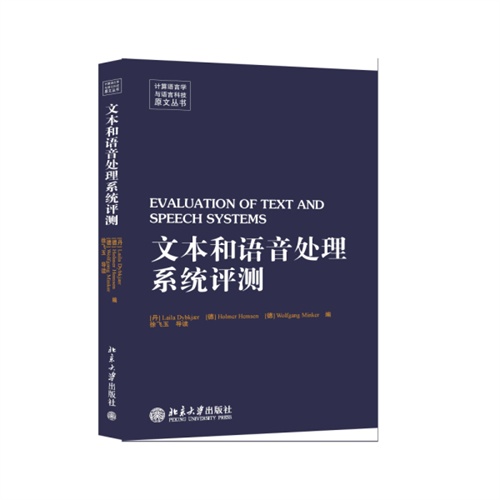暂无评论
图文详情
- ISBN:9787301249512
- 装帧:一般胶版纸
- 册数:暂无
- 重量:暂无
- 开本:16开
- 页数:288
- 出版时间:2014-12-01
- 条形码:9787301249512 ; 978-7-301-24951-2
本书特色
《文本和语音处理系统评测(英文影印版)》是"计算语言学与语言科技原文丛书"中的一册。文本和语音系统是计算语言学和语言技术的主要应用方向,涉及的范围非常广泛,几乎包括所有的语言技术应用系统。本书涵盖的内容非常丰富,既详细介绍了各种文本和语音系统及其评测的基础理论,又结合大量实例针对系统评测进行了明确的说明和解释。内容深入浅出,适合有一定背景知识的初学者或相关领域的科研工作者阅读,也可作为计算语言学专业教材。
内容简介
《文本和语音处理系统评测(英文影印版)》内容深入浅出,适合有一定背景知识的初学者或相关领域的科研工作者阅读,也可作为计算语言学专业教材。
目录
导读
preface
contributing authors
introduction
laila dybkj?r, holmer hemsen and wolfgang minker
1 speech and speaker recognition evaluation
sadaoki furui
1. introduction
2. principles of speech recognition
3. categories of speech recognition tasks
4. evaluation of speech recognition systems
5. principles of speaker recognition
6. categories of speaker recognition tasks
7. normalization and adaptation techniques
8. evaluation of speaker recognition systems
9. factors affecting the performance and evaluation paradigm
design for speech and speaker recognition systems
10. svstem-level evaluation of speech and speaker rognition…
11. conclusion
references
2 evaluation of speech synthesis
nick campbell
1. introduction
2. components of computer speech
3. evaluation methodologies
4. organised evaluations and assessment
5. speaking to (and on behalf of) people
6. conclusion
references
3 modelling and evaluating verbal and non-verbal
communication in talking animated interface agents
bj?rn granstr?m and david house
1. introduction
2. kth parametric multimodal speech synthesis
3. data collection and data-driven visual synthesis
4. evaluating intelligibility and information presentation
5. evaluating visual cues for prominence
6. evaluating prosody and interaction
7. evaluating visual cues to sentence mode
8. evaluation of agent expressiveness and attitude
9. agent and system evaluation studies
10. future challenges in modelling and evaluation
references
4 evaluating part-of-speech tagging and parsing
patrick paroubek
1. pos tagging
2. parsing
3. evaluation and natural language processing
4. pos tagging evaluation methodology
5. methodology and evaluation measures for parsing
6. conclusion
references
5 general principles of user-oriented evaluation
margaret king
1. a historical note
2. what is user-oriented evaluation?
3. a first principle: quality is decided by users
4. a second principle: users do not have the same needs
5. a third principle: quality can be characterized
6. a fourth principle: quality can be measured
7. combining the particular and the general: the ideal
8. conclusion
references
6 an overview of evaluation methods in trec ad hoc info-
rmation retrieval and trec question answering…
simone teufel
1. introduction
2. evaluation criteria
3. evaluation metrics
4. real-world performance
5. conclusion
references
7 spoken dialogue systems evaluation
niels ole bernsen, laila dybkj?r and wolfgang minker
1. introduction
2. evaluation methods and criteria
3. evaluation of the nice hans christian andersen prototype
4. evaluation of the seneca prototype
5. conclusion
references
8 linguistic resources, development,and evaluation of…
text and speech systems
christopher cieri
1. introduction
2. the linguistic resource landscape
3. background on linguistic data and annotation
4. data planning for technology development and evaluation
5. finding resources
6. building resources
7. conclusion
references
9 towards international standards for language
resources
nancy ide and laurent romary
1. introduction
2. background
3. the linguistic annotation framework
4. putting it all together
5. conclusion
references
index
preface
contributing authors
introduction
laila dybkj?r, holmer hemsen and wolfgang minker
1 speech and speaker recognition evaluation
sadaoki furui
1. introduction
2. principles of speech recognition
3. categories of speech recognition tasks
4. evaluation of speech recognition systems
5. principles of speaker recognition
6. categories of speaker recognition tasks
7. normalization and adaptation techniques
8. evaluation of speaker recognition systems
9. factors affecting the performance and evaluation paradigm
design for speech and speaker recognition systems
10. svstem-level evaluation of speech and speaker rognition…
11. conclusion
references
2 evaluation of speech synthesis
nick campbell
1. introduction
2. components of computer speech
3. evaluation methodologies
4. organised evaluations and assessment
5. speaking to (and on behalf of) people
6. conclusion
references
3 modelling and evaluating verbal and non-verbal
communication in talking animated interface agents
bj?rn granstr?m and david house
1. introduction
2. kth parametric multimodal speech synthesis
3. data collection and data-driven visual synthesis
4. evaluating intelligibility and information presentation
5. evaluating visual cues for prominence
6. evaluating prosody and interaction
7. evaluating visual cues to sentence mode
8. evaluation of agent expressiveness and attitude
9. agent and system evaluation studies
10. future challenges in modelling and evaluation
references
4 evaluating part-of-speech tagging and parsing
patrick paroubek
1. pos tagging
2. parsing
3. evaluation and natural language processing
4. pos tagging evaluation methodology
5. methodology and evaluation measures for parsing
6. conclusion
references
5 general principles of user-oriented evaluation
margaret king
1. a historical note
2. what is user-oriented evaluation?
3. a first principle: quality is decided by users
4. a second principle: users do not have the same needs
5. a third principle: quality can be characterized
6. a fourth principle: quality can be measured
7. combining the particular and the general: the ideal
8. conclusion
references
6 an overview of evaluation methods in trec ad hoc info-
rmation retrieval and trec question answering…
simone teufel
1. introduction
2. evaluation criteria
3. evaluation metrics
4. real-world performance
5. conclusion
references
7 spoken dialogue systems evaluation
niels ole bernsen, laila dybkj?r and wolfgang minker
1. introduction
2. evaluation methods and criteria
3. evaluation of the nice hans christian andersen prototype
4. evaluation of the seneca prototype
5. conclusion
references
8 linguistic resources, development,and evaluation of…
text and speech systems
christopher cieri
1. introduction
2. the linguistic resource landscape
3. background on linguistic data and annotation
4. data planning for technology development and evaluation
5. finding resources
6. building resources
7. conclusion
references
9 towards international standards for language
resources
nancy ide and laurent romary
1. introduction
2. background
3. the linguistic annotation framework
4. putting it all together
5. conclusion
references
index
展开全部
本类五星书
浏览历史
本类畅销
-

偏见
¥17.8¥56.0 -

乌合之众:大众心理研究
¥12.0¥36.8 -

饥饿、富裕与道德
¥17.2¥45.0 -

自卑与超越
¥13.7¥39.8 -

女性生存战争
¥29.7¥66.0 -

2025读书月阅读盲盒——你以为你以为的就是你以为的吗?
¥42.3¥168.0 -

自卑与超越-完整全译本
¥13.7¥39.8 -

社会学:原来这么有趣有用
¥10.0¥36.0 -

身为女性的选择
¥18.9¥56.0 -

西方哲学史
¥16.8¥38.0 -

儿童教育心理学
¥12.4¥38.0 -

咬文嚼字二百问
¥11.2¥32.0 -

性心理学
¥26.7¥58.0 -

乡土中国-彩色插图版
¥14.9¥39.8 -

怪癖心理学:解读种种怪诞现象背后的心里秘密
¥11.8¥36.0 -

从白大褂到病号服:探索医疗中的人性落差
¥18.0¥39.8 -

人际交往心理学
¥10.5¥38.0 -

苏联演变与民族问题研究
¥23.5¥48.0 -

文言浅说
¥10.1¥24.0 -

理解人性
¥12.9¥39.8














